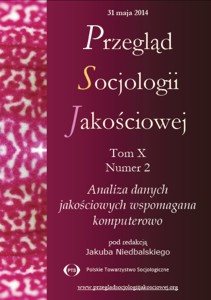Analiza sentymentu – metoda analizy danych jakościowych. Przykład zastosowania oraz ewaluacja słownika RID i metody klasyfikacji Bayesa w analizie dan
Sentiment analysis. An example of application and evaluation of RID dictionary and Bayesian classification methods in qualitative data analysis approa
Author(s): Krzysztof TomanekSubject(s): Social Sciences
Published by: Uniwersytet Łódzki - Wydział Ekonomiczno-Socjologiczny
Keywords: qualitative data analysis; sentiment analysis; content analysis; text mining; coding techniques; natural language processing; RID dictionary; naive Bayes; CAQDAS
Summary/Abstract: The purpose of this article is to present the basic methods for classifying text data. These methods make use of achievements earned in areas such as: natural language processing, the analysis of unstructured data. I introduce and compare two analytical techniques applied to text data. The first analysis makes use of thematic vocabulary tool (sentiment analysis). The second technique uses the idea of Bayesian classification and applies, so-called, naive Bayes algorithm. My comparison goes towards grading the efficiency of use of these two analytical techniques. I emphasize solutions that are to be used to build dictionary accurate for the task of text classification. Then, I compare supervised classification to automated unsupervised analysis’ effectiveness. These results reinforce the conclusion that a dictionary which has received good evaluation as a tool for classification should be subjected to review and modification procedures if is to be applied to new empirical material. Adaptation procedures used for analytical dictionary become, in my proposed approach, the basic step in the methodology of textual data analysis.
Journal: Przegląd Socjologii Jakościowej
- Issue Year: X/2014
- Issue No: 2
- Page Range: 118-136
- Page Count: 19
- Language: Polish

